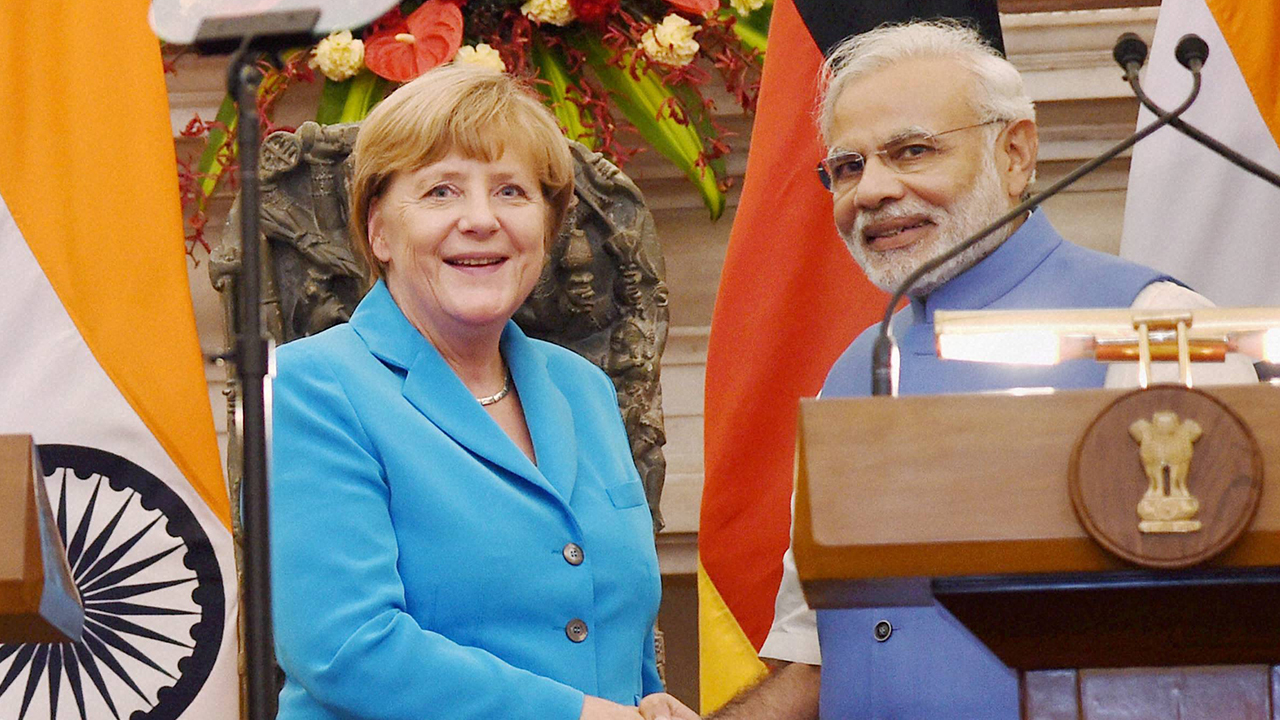Prime Minister Narendra Modi is on a six day tour to four nations, to strengthen India’s international relations with Germany, Spain, Russia and France. His first stop was in Germany on Monday, where he was hosted by the German Chancellor Angela Merkel at the official state guest house of the Chancellor. Modi and Merkel had informal meeting on Monday evening followed by dinner. Tuesday morning, a ceremonial welcome was held for Modi at the Chancellery for the Fourth Inter-Governmental Consultations (IGC).
While addressing at the IGC Modi urged Europe to take the lead role with the help of UN to fight against terrorism. India and Germany vowed to take “strong measures” against those who encourage, support and finance terrorism. Further talking about the relations between India and Germany, he emphasised that Indo-German ties should be outcome-oriented, adding that “India and Germany are made for each other.” “Pace of development of our relations is fast, direction positive and destination clear. Germany will always find India as powerful, prepared and capable partner,” Modi said at a joint press interaction.
Following their talks and reviewing the scope of the bilateral issues, both the leaders signed 12 agreements. Eight of the declarations of intent were signed by senior ministers and envoys in the prime ministerial delegation in the presence of the two leaders while the others were confirmed on the sidelines. The two sides signed a joint declaration of intent on cyber politics, development initiatives, sustainable urban development, continued development of cluster managers and skill development, cooperation in the field of digitalisation, cooperation in the field of railway security, promoting vocational training and continued cooperation on an Indo-German centre for sustainability.
Germany on also pitched for an early bilateral as well as pan-EU free trade agreement (FTA) with India for mutual benefit and also extended development assistance of €1 billion to India. India-Germany Bilateral Investment Protection Treaty expired this March and Broad-Based Trade and Investment Agreement (BTIA) between India and the EU remains inconclusive despite 16 rounds of negotiations. As per the joint statement issued at the end of IGC, both leaders reaffirmed their commitment to resuming BTIA negotiations at the earliest.
Merkel made it clear that her country would push for an FTA between India and the EU in Brussels. “It’s important that we make progress on the German-Indian, or rather EU-Indian free trade agreement,” she said.
Pushing economic envelope was the primary agenda of this round of IGC.
Modi also pitched about GST saying that it is among the most historic business reforms in India and urged German investors to make use of one of the most liberal FDI regimes in the world. He added that India is the sixth largest manufacturing nation in the world and is aggressively moving towards being a global manufacturing hub. He also mentioned that India has formally decided to abolish the Foreign Investment Promotion Board, to examine the Foreign Direct Investment proposals. As a result of this decision, FDI outlook has been ranked highly positive by various international agencies and there has been tremendous growth in FDI inflows in the past three years. “India is a big country. Hence, nothing is enough when it comes to development. We have many dreams. And the dreams are big. But we have small timelines. And this is your opportunity”, he said.
The two leaders issued a Joint Statement at the end of their deliberations, in which they agreed to further strengthen the Strategic Partnership between India and Germany by deepening cooperation on foreign policy and security issues as well as on sustainable development and enhanced trade and investment ties.
After the IGC meet, the Chancellor hosted Modi over a lunch meeting with senior leaders, followed by the inauguration of the Indo-German Business Summit, where Modi set out India’s stall as an investment-friendly destination and the world’s fastest growing major economy.
Prime Minister Narendra Modi today seeked “outcome-oriented” momentum in Indo-German ties and a “quantum jump” in economic relations of India and Germany.
Before leaving for Spain, the second stop of his four-nation trip, Narendra Modi paid a courtesy visit to German President Frank-Walter Steinmeier at Castle Bellevue, the scenic official residence of the German President located in Berlin’s Tiergarten district. He signed the visitors book and was later given the tour of the castle.
“Reaffirming resolve for strong and dynamic relationship. PM @narendramodi calls on President Frank-Walter Steinmeier at Castle Bellevue,” External Affairs Ministry spokesperson Gopal Baglay tweeted.
Reaffirming resolve for strong and dynamic relationship. PM @narendramodi calls on President Frank-Walter Steinmeier at Castle Bellevue pic.twitter.com/2SPuLcisZc
— Gopal Baglay (@MEAIndia) May 30, 2017
“Thank you Germany! My visit has led to very positive outcomes in terms of furthering the close ties India and Germany enjoy,” Modi said in his goodbye message as he left for Spain.
After fruitful bilateral engagements, PM @narendramodi concludes first leg of his visit, departs from Germany pic.twitter.com/tigNn1fB1x
— Gopal Baglay (@MEAIndia) May 30, 2017

